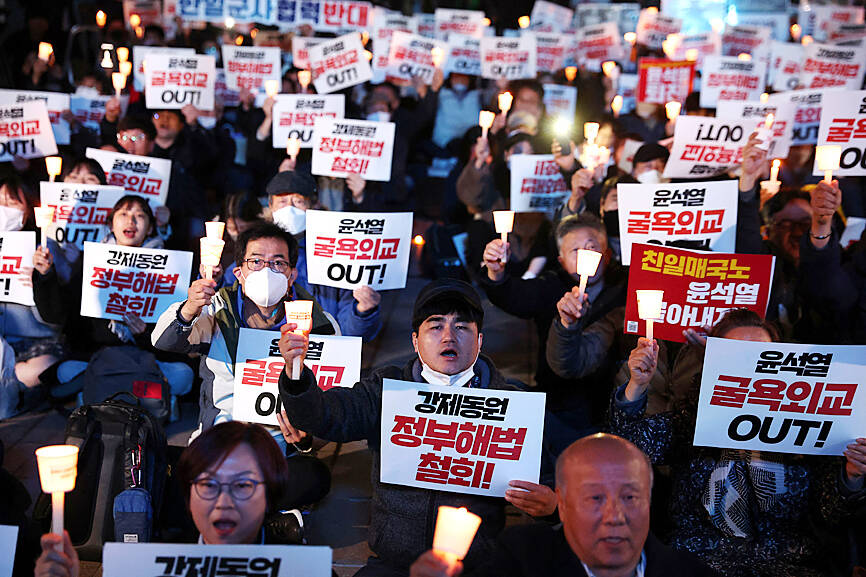South Korea yesterday announced plans to compensate victims of Japan’s forced wartime labor, aiming to end a “vicious cycle” in the Asian powers’ relations and boost ties to counter nuclear-armed North Korea.
Japan and the US immediately welcomed the announcement, but victims’ groups said it fell far short of their demand for a full apology from Tokyo and direct compensation from the Japanese companies involved.
Seoul and Tokyo have ramped up security cooperation in the face of growing threats from North Korea, which is expanding its nuclear weapons program in defiance of UN sanctions.

Photo: Reuters
However, Seoul-Tokyo ties have long been strained over Tokyo’s brutal 1910-1945 colonial rule of the Korean Peninsula, when about 780,000 Koreans were conscripted into forced labor by Japan, according to data from Seoul.
This does not include the Korean women forced into sexual slavery by Japanese troops.
Seoul’s plan is to take money from major South Korean firms that benefited from a 1965 reparations deal with Tokyo, and use it to compensate victims and their families, South Korean Minister of Foreign Affairs Park Jin said.
The hope is that Japan will “positively respond to our major decision today with Japanese companies’ voluntary contributions and a comprehensive apology,” he added.
“I believe that the vicious cycle should be broken for the sake of national interest,” Park added.
Japanese Minister of Foreign Affairs Yoshimasa Hayashi welcomed the new plan, telling reporters it would help to restore “healthy” ties.
The plan does not include a fresh apology, although Hayashi said Tokyo stands by a 1998 declaration that included an apology.
Japanese media have also reported that South Korean President Yoon Suk-yeol could soon visit Tokyo, possibly even for a Japan-South Korea baseball game this week.
However, it remained unclear whether Japanese companies, including those such as Nippon Steel, which were named in the 2018 court ruling, would make voluntary contributions to the new fund.
Nippon Steel said it had no comment on the ruling, adding that “our company’s understanding is that this issue has been resolved by the 1965 Agreement.”
Park said the plan had the support of many victims’ families, adding that Seoul would “see them one by one and consult with them and seek their understanding sincerely”.
However, the plan had already drawn strong protests from victims’ groups.
“It is as if the bonds of the victims of forced labor are being dissolved through South Korean companies’ money,” Lim Jae-sung, a lawyer for several victims, said in a Facebook post on Sunday.
“It is a complete victory for Japan, which can’t spare even one yen on the issue of forced labor,” Lim said.

CARROT AND STICK: While unrelenting in its military threats, China attracted nearly 40,000 Taiwanese to over 400 business events last year Nearly 40,000 Taiwanese last year joined industry events in China, such as conferences and trade fairs, supported by the Chinese government, a study showed yesterday, as Beijing ramps up a charm offensive toward Taipei alongside military pressure. China has long taken a carrot-and-stick approach to Taiwan, threatening it with the prospect of military action while reaching out to those it believes are amenable to Beijing’s point of view. Taiwanese security officials are wary of what they see as Beijing’s influence campaigns to sway public opinion after Taipei and Beijing gradually resumed travel links halted by the COVID-19 pandemic, but the scale of

TRADE: A mandatory declaration of origin for manufactured goods bound for the US is to take effect on May 7 to block China from exploiting Taiwan’s trade channels All products manufactured in Taiwan and exported to the US must include a signed declaration of origin starting on May 7, the Bureau of Foreign Trade announced yesterday. US President Donald Trump on April 2 imposed a 32 percent tariff on imports from Taiwan, but one week later announced a 90-day pause on its implementation. However, a universal 10 percent tariff was immediately applied to most imports from around the world. On April 12, the Trump administration further exempted computers, smartphones and semiconductors from the new tariffs. In response, President William Lai’s (賴清德) administration has introduced a series of countermeasures to support affected

Pope Francis is be laid to rest on Saturday after lying in state for three days in St Peter’s Basilica, where the faithful are expected to flock to pay their respects to history’s first Latin American pontiff. The cardinals met yesterday in the Vatican’s synod hall to chart the next steps before a conclave begins to choose Francis’ successor, as condolences poured in from around the world. According to current norms, the conclave must begin between May 5 and 10. The cardinals set the funeral for Saturday at 10am in St Peter’s Square, to be celebrated by the dean of the College

CROSS-STRAIT: The vast majority of Taiwanese support maintaining the ‘status quo,’ while concern is rising about Beijing’s influence operations More than eight out of 10 Taiwanese reject Beijing’s “one country, two systems” framework for cross-strait relations, according to a survey released by the Mainland Affairs Council (MAC) on Thursday. The MAC’s latest quarterly survey found that 84.4 percent of respondents opposed Beijing’s “one country, two systems” formula for handling cross-strait relations — a figure consistent with past polling. Over the past three years, opposition to the framework has remained high, ranging from a low of 83.6 percent in April 2023 to a peak of 89.6 percent in April last year. In the most recent poll, 82.5 percent also rejected China’s